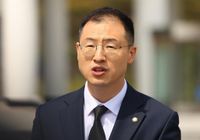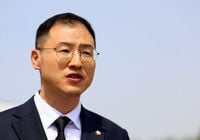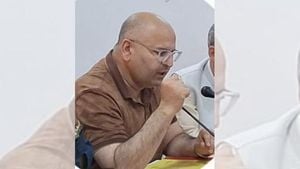In a significant political shift, Kim Sang-wook, a member of the People Power Party (PPP), declared his departure from the party on May 8, 2025. During a press conference held at the Seoul National Cemetery in Dongjak-gu, Kim announced his intention to pursue a path of "true democratic conservatism," distancing himself from what he described as extreme right-wing politics.
Kim's decision to leave the PPP comes amid growing internal conflict within the party, particularly following his support for the impeachment of former President Yoon Seok-yeol. He expressed his disappointment with the party's current trajectory, stating, "I had earnestly hoped that the People Power Party would function as a traditional conservative party for the nation and the people, but I must now accept that the party finds itself in an extreme situation where its potential has been lost." This sentiment underscores his profound disillusionment with the party's direction.
The backdrop of Kim's departure includes his participation in the resolution to lift emergency measures on December 3, which further alienated him from party leadership. His stance on key issues, particularly regarding the impeachment of Yoon, has led to significant friction within the party, resulting in Kim facing pressure to resign.
Kim's announcement was met with immediate reactions from the political landscape. Kim Min-seok, co-chairman of the Democratic Party's election committee, commented on the situation, suggesting that those disillusioned by the PPP might find a viable alternative in the Democratic Party. He stated, "It would be good if one of the choices that those people are interested in turns out to be the Democratic Party." This remark highlights the potential for Kim to shift allegiances amid the ongoing political realignment.
In his press conference, Kim conveyed his apologies to his fellow lawmakers and supporters within the PPP, stating, "I extend my apologies to my senior colleagues, fellow lawmakers, and supporters of the People Power Party." His departure marks a pivotal moment not only for Kim but also for the PPP, which has been grappling with internal divisions and pressures.
Kim's commitment to "democratic conservatism" reflects a broader desire for a political environment that embraces democratic values, the rule of law, fairness, reason, openness, inclusion, and freedom. He urged the PPP leadership to embody these principles, stating, "The values of conservatism in 2025 should be based on democracy and the rule of law." This call for a principled approach to conservatism resonates with a segment of the electorate that feels neglected by the current party leadership.
Despite his departure, speculation surrounds Kim's future political ambitions, particularly regarding a possible run in the next presidential election. He expressed a desire to engage with other candidates, including Lee Jae-myung and Lee Jun-seok, stating, "If the opportunity arises, I would like to meet with presidential candidates to discuss solutions to current issues and the direction of the country." This openness to collaboration suggests that Kim is not closing the door on future political endeavors.
As Kim transitions to being an independent lawmaker, he faces the challenge of navigating a political landscape that has become increasingly polarized. His departure from the PPP raises questions about the future of moderate conservatism in South Korea and whether there is a viable path for those who seek to distance themselves from the extremes of party politics.
Kim's journey within the PPP has not been without its challenges. He was elected to the National Assembly in April 2024 under the party’s "People-Recommended System" in the Ulsan Nam-gu district, supported by Han Dong-hoon. This position allowed him to gain recognition as a rational conservative figure, but his subsequent actions, including supporting the impeachment of Yoon, have placed him at odds with the party's more hardline factions.
In light of his recent departure, Kim has emphasized the importance of maintaining the dignity of conservatism. He articulated a vision for a conservatism that is open to new ideas and willing to learn from others, stating, "I hope to show the qualities of conservatism that embrace newness and learn from others." This perspective indicates a shift away from traditional conservative dogma towards a more inclusive approach.
As the political landscape in South Korea continues to evolve, Kim's departure from the PPP could signal a broader trend of moderates seeking new affiliations. The Democratic Party's potential interest in Kim suggests that there may be opportunities for collaboration across party lines, particularly as the country approaches the next presidential election.
In conclusion, Kim Sang-wook's departure from the People Power Party marks a significant moment in South Korean politics. His commitment to pursuing a path of democratic conservatism reflects a desire for a more principled approach to governance, while his willingness to engage with other political figures indicates that he is not yet finished with the political arena. As the country navigates its complex political landscape, the implications of Kim's departure will likely resonate for some time.





